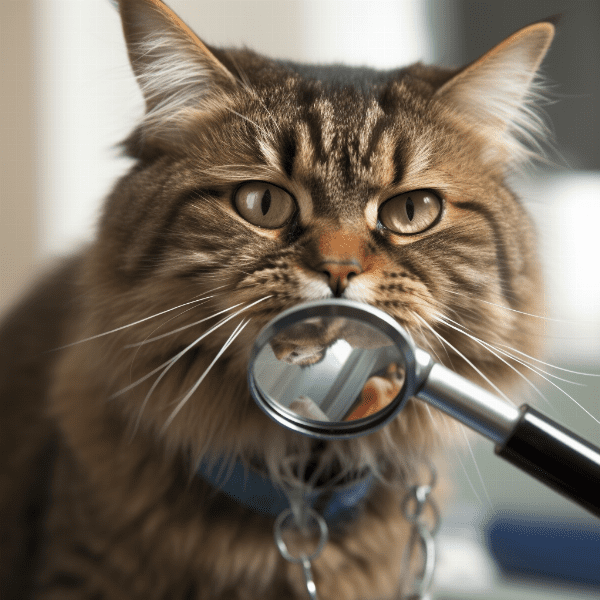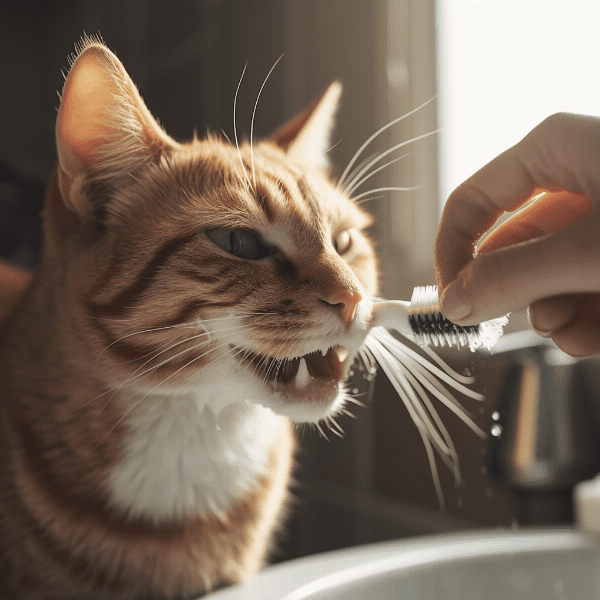Table of Contents
- Understanding Cat Inflamed Gums: Causes and Symptoms
- Visiting the Vet: Diagnosis and Treatment Options
- Prevention is Key: Maintaining Good Oral Health for Your Cat
- Home Remedies for Cat Inflamed Gums: Do They Work?
- Diet and Nutrition: How it Affects Your Cat’s Oral Health
- Brushing Your Cat’s Teeth: Tips and Techniques
- Other Oral Care Products: Which Ones Are Safe and Effective?
- When to Seek Emergency Care for Your Cat’s Inflamed Gums
- Dealing with Chronic Inflamed Gums: Long-Term Management Strategies
- Support and Care: Helping Your Cat Through Inflamed Gums Recovery
Understanding Cat Inflamed Gums: Causes and Symptoms
If you’re a cat owner, you may have noticed your furry friend exhibiting signs of discomfort or pain when eating, grooming, or playing. One possible reason for this could be inflamed gums. Inflamed gums, also known as gingivitis, is a common dental issue in cats.
Causes of Cat Inflamed Gums
There are several causes of Cat inflamed gums. One of the most common causes is the buildup of plaque and tartar on the teeth, which can lead to an accumulation of bacteria in the gums. Other causes may include:
- Poor dental hygiene
- Viral or bacterial infections
- Immune system disorders
- Trauma to the mouth or gums
- Poor nutrition
It’s important to note that cat inflamed gums can be a symptom of a more serious underlying condition, such as feline leukemia or feline immunodeficiency virus (FIV). If your cat is experiencing inflamed gums, it’s important to consult with a veterinarian to rule out any underlying health issues.
Symptoms of Cat Inflamed Gums
The symptoms of cat inflamed gums can vary depending on the severity of the condition. Some common symptoms include:
- Bad breath
- Swollen or bleeding gums
- Difficulty eating or chewing
- Pawing at the mouth or face
- Drooling
- Yellow or brown discoloration on the teeth
- Loose or missing teeth
It’s important to note that some cats may not exhibit any symptoms at all, which is why regular dental checkups with a veterinarian are crucial for maintaining your cat’s oral health.
Overall, understanding the causes and symptoms of cat inflamed gums is crucial for providing your furry friend with the proper care and treatment. By being proactive in maintaining your cat’s oral health, you can help prevent the onset of this common dental issue and ensure that your cat is happy and healthy for years to come.
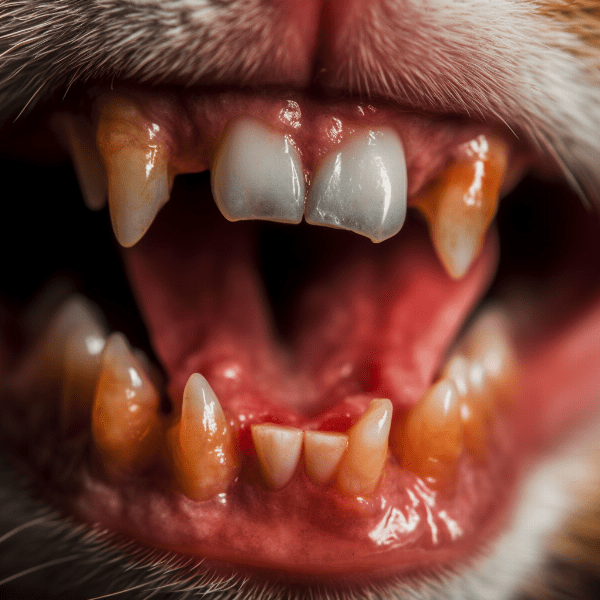
Visiting the Vet: Diagnosis and Treatment Options
If you suspect that your cat may have inflamed gums, it’s important to schedule a visit to the veterinarian. A veterinarian can diagnose and treat inflamed gums and help prevent any potential complications.
Diagnosis of Cat Inflamed Gums
During the diagnosis process, a veterinarian will conduct a thorough examination of your cat’s teeth and gums. They may also perform a blood test to rule out any underlying health issues. If necessary, the veterinarian may also take X-rays to evaluate the extent of any potential damage to the teeth or gums.
Treatment Options for Cat Inflamed Gums
The treatment for cat inflamed gums will depend on the severity of the condition. In mild cases, a veterinarian may recommend a professional teeth cleaning to remove plaque and tartar buildup. In more severe cases, a veterinarian may recommend antibiotics to clear up any bacterial infections in the gums.
In addition to professional treatment, there are several things you can do at home to help manage your cat’s inflamed gums. These may include:
- Regular teeth brushing using a pet-safe toothpaste
- Providing your cat with dental chews or toys to promote oral health
- Adjusting your cat’s diet to include foods that promote dental health
- Administering any prescribed medications as directed by your veterinarian
It’s important to note that cat inflamed gums can be a chronic issue, so it’s crucial to work with your veterinarian to develop a long-term management plan for your cat’s oral health.
Overall, visiting the vet is an important step in diagnosing and treating cat inflamed gums. With proper diagnosis and treatment, you can help prevent the progression of the condition and ensure that your cat is happy and healthy for years to come.
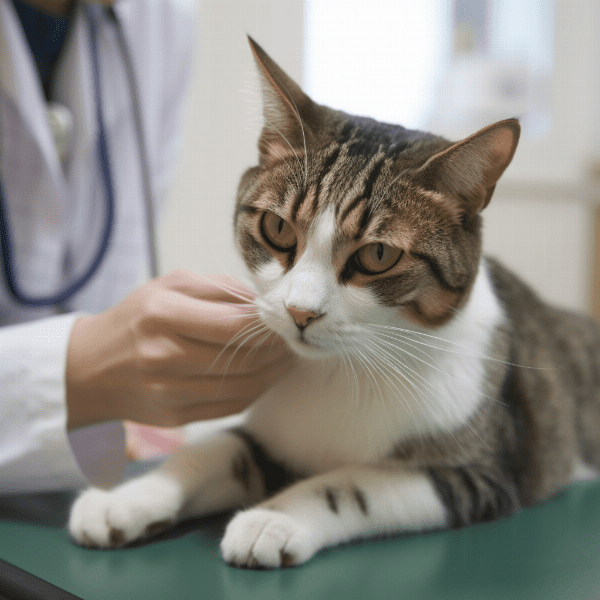
Prevention is Key: Maintaining Good Oral Health for Your Cat
One of the best ways to prevent cat inflamed gums is to maintain good oral hygiene for your cat. By taking preventative measures, you can help ensure that your cat’s teeth and gums stay healthy and strong.
Dental Hygiene for Cats
Just like humans, cats need regular dental care to maintain good oral health. This includes brushing your cat’s teeth regularly using a pet-safe toothpaste and toothbrush. You can also provide your cat with dental chews or toys to help promote oral health.
Diet and Nutrition
Diet and nutrition can also play a big role in maintaining your cat’s oral health. Feeding your cat a well-balanced diet that is rich in vitamins and minerals can help keep their teeth and gums strong. Additionally, providing your cat with chewy or crunchy foods can help remove plaque and tartar buildup from their teeth.
Early Intervention
If you notice any signs of inflamed gums in your cat, it’s important to take action early. By addressing the issue early on, you can help prevent it from progressing into a more serious condition. This may include scheduling a visit to the veterinarian or adjusting your cat’s diet and dental care routine.
Overall, prevention is key when it comes to maintaining good oral health for your cat. By prioritizing dental hygiene, providing a balanced diet, scheduling regular checkups with a veterinarian, and taking early action when necessary, you can help ensure that your cat’s teeth and gums stay healthy and strong for years to come.
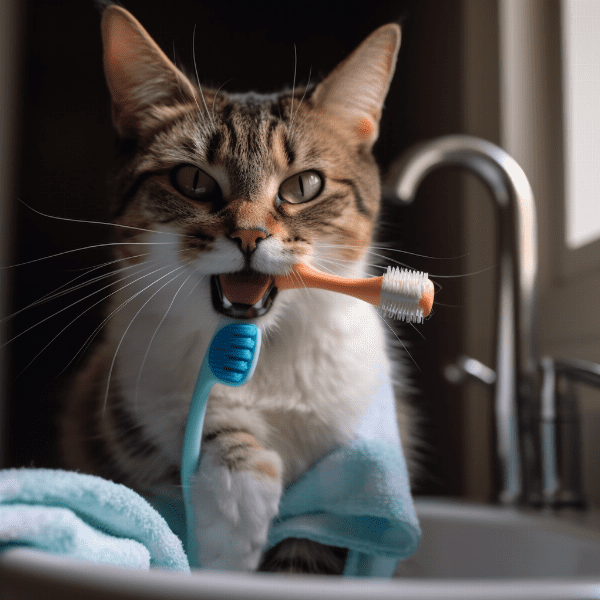
Home Remedies for Cat Inflamed Gums: Do They Work?
If you’re looking for natural or at-home remedies for cat inflamed gums, there are several options available. While some home remedies may provide temporary relief, it’s important to note that they are not a substitute for professional veterinary care.
Saltwater Rinse
One common home remedy for cat inflamed gums is a saltwater rinse. To create a saltwater rinse, mix a teaspoon of salt with a cup of warm water. Gently swish the rinse in your cat’s mouth, being careful not to swallow any of the solution. Saltwater rinses can help reduce inflammation and provide temporary relief.
Aloe Vera Gel
Aloe vera gel is a natural anti-inflammatory agent that may provide relief for cat inflamed gums. Apply a small amount of aloe vera gel directly to your cat’s gums and let it sit for a few minutes before rinsing with water.
Coconut Oil
Coconut oil has antimicrobial properties that may help reduce inflammation and prevent infection. To use coconut oil as a home remedy for cat inflamed gums, apply a small amount of the oil directly to your cat’s gums and let it sit for a few minutes before rinsing with water.
It’s important to note that while home remedies may provide temporary relief for cat inflamed gums, they are not a substitute for professional veterinary care. If your cat is experiencing inflamed gums, it’s important to consult with a veterinarian to rule out any underlying health issues and receive proper treatment.
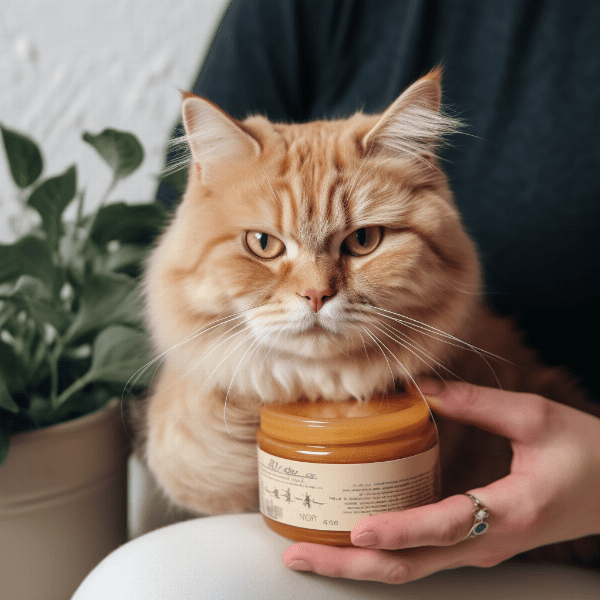
Diet and Nutrition: How it Affects Your Cat’s Oral Health
The Role of Nutrition in Cat Oral Health
Feeding your cat a well-balanced diet that is rich in vitamins and minerals can help promote healthy teeth and gums. In particular, a diet that is high in protein can help keep your cat’s teeth strong and healthy. Additionally, crunchy or chewy foods can help remove plaque and tartar buildup from your cat’s teeth.
- Raw bones: Raw bones can help scrape away plaque and tartar buildup from your cat’s teeth. It’s important to note that cooked bones can be dangerous for cats, so only provide raw bones that are appropriate for your cat’s size and breed.
- Dental chews: Dental chews are specifically designed to promote oral health in cats. They can help remove plaque and tartar buildup from your cat’s teeth and freshen their breath.
- Crunchy kibble: Providing your cat with crunchy kibble can help remove plaque and tartar buildup from their teeth. Be sure to choose a high-quality cat food that is specifically formulated for your cat’s age, breed, and health needs.
Foods to Avoid
There are also several foods that can be detrimental to your cat’s oral health. These may include:
- Sugary treats: Sugary treats can promote the growth of bacteria in your cat’s mouth, leading to plaque and tartar buildup.
- Sticky foods: Sticky foods, such as dried fruits or sticky treats, can get stuck in your cat’s teeth and promote the growth of bacteria.
- Human food: Human food, such as table scraps or processed foods, can be high in sugar and salt, which can be harmful to your cat’s oral health.
Overall, diet and nutrition play an important role in maintaining your cat’s oral health. By providing your cat with a well-balanced diet that is rich in protein and avoiding sugary or sticky foods, you can help promote healthy teeth and gums and prevent the onset of cat inflamed gums.
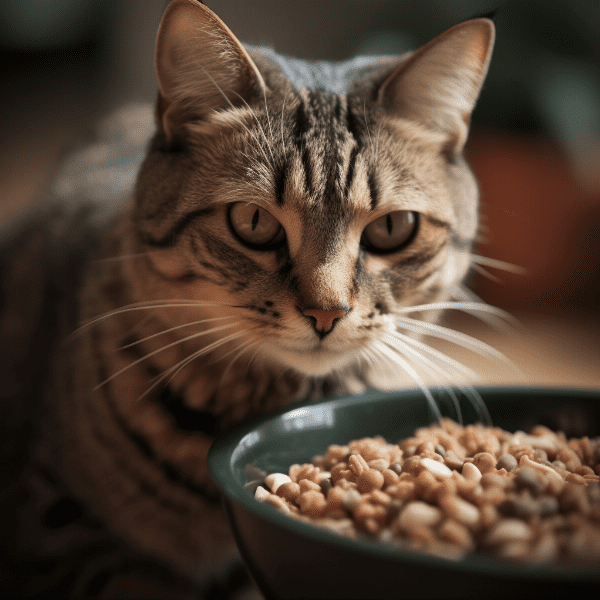
Brushing Your Cat’s Teeth: Tips and Techniques
Brushing your cat’s teeth is an important part of maintaining their oral health. While it may seem like a daunting task, with some patience and practice, it can become a regular part of your cat’s dental care routine.
Benefits of Brushing Your Cat’s Teeth
Brushing your cat’s teeth can help prevent the onset of cat inflamed gums and other dental issues. By removing plaque and tartar buildup from your cat’s teeth, you can help prevent the growth of harmful bacteria in their mouth. Additionally, regular brushing can help freshen your cat’s breath and improve their overall oral health.
How to Brush Your Cat’s Teeth
When brushing your cat’s teeth, it’s important to use a pet-safe toothpaste and toothbrush. You should never use human toothpaste on your cat, as it can be harmful to their health.
To begin brushing your cat’s teeth, start by letting them smell and taste the toothpaste. Next, gently lift your cat’s lips and use a circular motion to brush their teeth and gums. Be sure to focus on the outside surfaces of their teeth, as this is where plaque and tartar buildup is most common.
Tips for Brushing Your Cat’s Teeth
Brushing your cat’s teeth can be a challenge, especially if they are not used to the process. Here are some tips to help make brushing easier and more effective:
- Start slowly and work your way up to longer brushing sessions.
- Reward your cat with treats or praise after each brushing session.
- Use a pet-safe toothpaste that comes in flavors that your cat enjoys.
- Be patient and gentle with your cat, and never force them to brush their teeth.
Alternatives to Brushing
If your cat is not comfortable with brushing, there are several alternatives that can help promote their oral health. These may include providing your cat with dental chews, adding dental water additives to their drinking water, or using oral gels that can help reduce plaque and tartar buildup.
Overall, brushing your cat’s teeth is an important part of maintaining their oral health. By using pet-safe toothpaste and toothbrushes and following the proper techniques, you can help prevent the onset of cat inflamed gums and other dental issues.
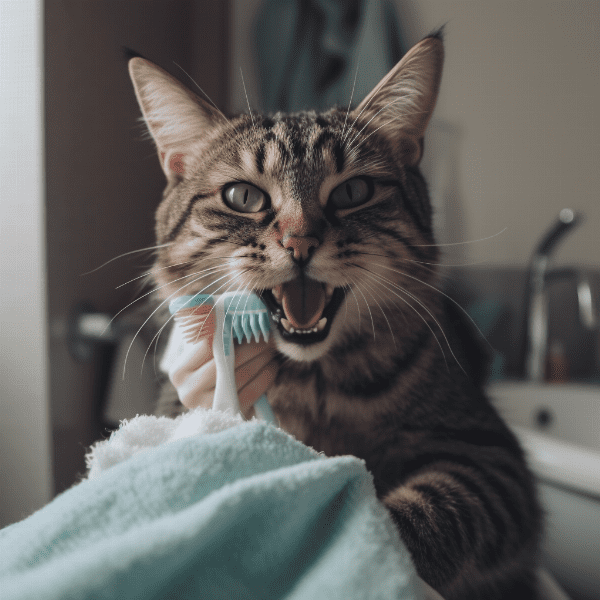
Other Oral Care Products: Which Ones Are Safe and Effective?
In addition to brushing your cat’s teeth, there are several other oral care products available that can help promote your cat’s oral health. However, it’s important to choose products that are safe and effective for your furry friend.
Dental Chews
Dental chews are a popular oral care product for cats. They are specifically designed to promote oral health by removing plaque and tartar buildup from your cat’s teeth. However, it’s important to choose dental chews that are appropriately sized for your cat and made from safe, high-quality ingredients.
Oral Gels
Oral gels are another option for promoting your cat’s oral health. These gels are applied directly to your cat’s teeth and gums and can help reduce inflammation and prevent the growth of harmful bacteria. However, it’s important to choose oral gels that are safe for cats and made from non-toxic ingredients.
Probiotics
Probiotics are beneficial bacteria that can help promote digestive health and boost the immune system. They may also be beneficial for promoting oral health in cats. However, it’s important to choose probiotics that are specifically formulated for cats and made from safe, high-quality ingredients.
Overall, there are several oral care products available that can help promote your cat’s oral health. When choosing products, it’s important to do your research and choose ones that are safe and effective for your furry friend. Additionally, it’s important to remember that regular dental checkups with a veterinarian are crucial for maintaining your cat’s oral health.
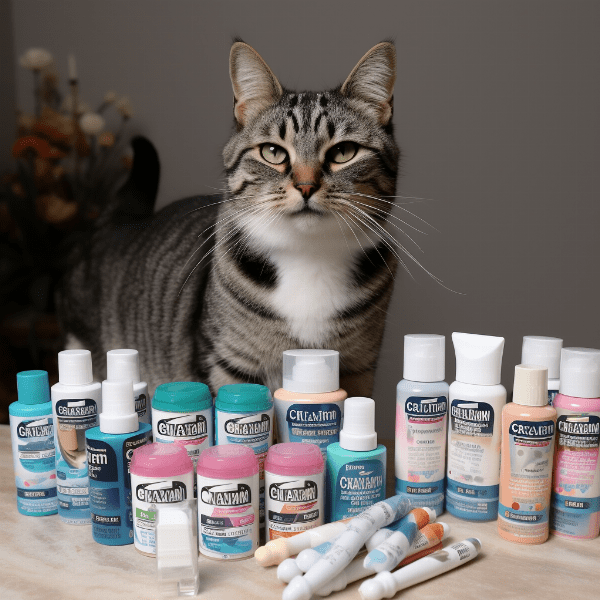
When to Seek Emergency Care for Your Cat’s Inflamed Gums
While cat inflamed gums can often be treated with proper dental care and management, there may be situations where emergency care is necessary. Here are some signs that indicate it’s time to seek emergency care for your cat’s inflamed gums.
Persistent Pain
If your cat is experiencing persistent pain or discomfort in their mouth, it’s important to seek emergency care. This may include signs such as crying out in pain, reluctance to eat or drink, or pawing at their mouth.
Excessive Bleeding
If your cat’s inflamed gums are bleeding excessively, it’s important to seek emergency care. Excessive bleeding may be a sign of a more serious issue, such as a gum infection or tooth abscess.
Difficulty Breathing
If your cat is having difficulty breathing, it’s important to seek emergency care immediately. Inflamed gums can cause swelling and inflammation in the mouth and throat, which can make it difficult for your cat to breathe.
Lethargy or Depression
If your cat is showing signs of lethargy or depression, it may be a sign that they are in pain or discomfort. If these symptoms persist, it’s important to seek emergency care to determine the cause and provide appropriate treatment.
Overall, if you notice any concerning symptoms related to your cat’s inflamed gums, it’s important to seek emergency care. Early intervention can help prevent the progression of the condition and ensure that your cat receives the care they need to stay healthy and happy.
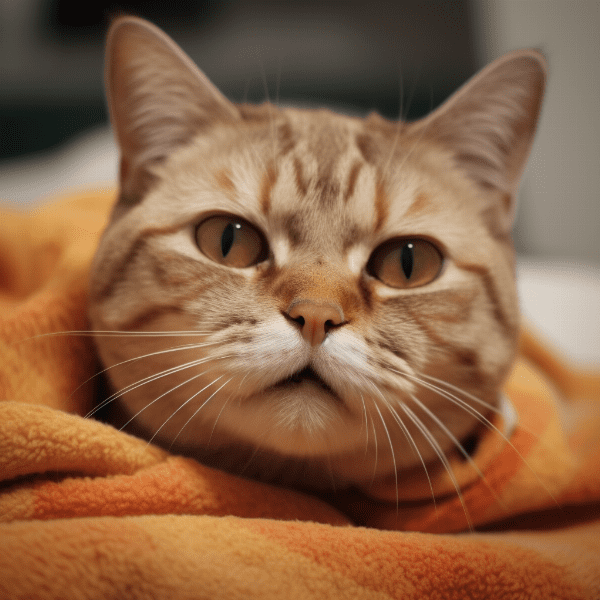
Dealing with Chronic Inflamed Gums: Long-Term Management Strategies
While proper dental care and management can help prevent and treat cat inflamed gums, some cats may be prone to chronic or recurring inflammation. Here are some long-term management strategies to help deal with chronic inflamed gums in cats.
Regular Dental Checkups
Regular dental checkups with a veterinarian are crucial for managing chronic inflamed gums in cats. During these checkups, your veterinarian can monitor your cat’s oral health and identify any potential issues before they become more serious.
Professional Dental Cleanings
Professional dental cleanings are an important part of managing chronic inflamed gums in cats. These cleanings help remove plaque and tartar buildup from your cat’s teeth and gums, reducing the risk of inflammation and infection.
Dietary Changes
Dietary changes can also play a role in managing chronic inflamed gums in cats. Providing your cat with a well-balanced diet that is high in protein and low in sugar can help promote healthy teeth and gums.
Medications
In some cases, medications may be necessary to manage chronic inflamed gums in cats. This may include antibiotics to treat infections or anti-inflammatory medications to reduce inflammation and pain.
Overall, managing chronic inflamed gums in cats requires a multi-faceted approach that involves proper dental care, regular checkups with a veterinarian, and potentially medications or dietary changes. By taking a proactive approach to your cat’s oral health, you can help prevent the onset of inflammation and promote long-term oral health.
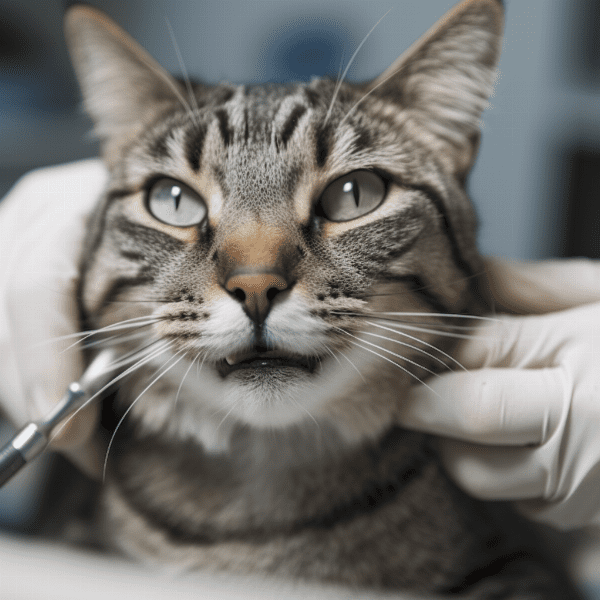
Support and Care: Helping Your Cat Through Inflamed Gums Recovery
Dealing with cat inflamed gums can be a challenging experience for both you and your furry friend. Here are some tips for providing support and care to help your cat through the recovery process.
Comfort and Rest
If your cat is experiencing pain or discomfort due to inflamed gums, it’s important to provide them with a comfortable and quiet place to rest. This may include a cozy bed or a quiet room where they can relax and recover.
Pain Management
If your cat is experiencing pain or discomfort, your veterinarian may prescribe pain medication to help manage their symptoms. Be sure to follow your veterinarian’s instructions for administering medication and monitor your cat for any adverse reactions.
Soft, Moist Food
If your cat is having difficulty eating or is experiencing pain while eating, you may need to provide them with soft, moist food. This can help reduce the strain on their inflamed gums and make eating more comfortable.
Dental Care
Proper dental care is essential for helping your cat recover from inflamed gums. This may include brushing their teeth regularly, providing them with dental chews or treats, and using oral gels or water additives to promote oral health.
Emotional Support
Dealing with a health issue can be stressful for your cat, so it’s important to provide them with emotional support during the recovery process. This may include spending extra time with them, providing them with comfort items such as blankets or toys, and offering plenty of praise and reassurance.
Follow-up Care
Once your cat has recovered from inflamed gums, it’s important to continue providing them with regular dental care and checkups with a veterinarian. This can help prevent the recurrence of inflammation and promote long-term oral health.
Overall, providing support and care to your cat during the recovery process is crucial for promoting their health and wellbeing. By providing them with comfort, pain management, proper dental care, and emotional support, you can help your furry friend recover from cat inflamed gums and get back to their happy, healthy self.



